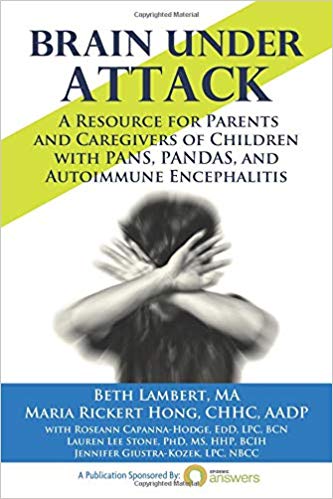November 29, 2018

Image courtesy of Victor Habbick at FreeDigitalPhotos.net
I recently gave a keynote presentation on how stress affects the brain and human behavior and part of that presentation was my own personal story of dealing with my teenage son’s lyme-induced PANS. I asked the audience of 600 if anyone had ever heard of PANS, and there were no hands shown. When I asked if anyone had heard of PANDAS, a gentleman said, “Yeah – the bear.” To which I replied, “Yes, a rabid bear.”
If you have a child with PANS or PANDAS or autoimmune encephalitis (AE), you know that my attempt at humor there was not really too far off in terms of how it feels. It is isolating, confusing, confounding, often times dangerous, and you become marginalized because it feels as though no one else even remotely understands what you and your child’s lives have become—including the medical professionals who are part of your established network of care. We live in a constant state of survival, trying to figure a way out of this situation that most closely resembles hell.
Thankfully, there is a new book available to help parents and caregivers find a path toward healing when they are faced with these conditions. Brain Under Attack: A Resource for Parents and Caregivers of Children with PANS, PANDAS, and Autoimmune Encephalitis, by Beth Lambert, Maria Rickert Hong, and others from Epidemic Answers, should be in the hands not only of parents dealing with these conditions but also every medical practitioner who treats children. And we should also add to that list: teachers, paraprofessionals, family members, and neighbors.
 This book contains quite a bit of information about the science of what PANS/PANDAS/AE is, but it does so in an easy-to-understand way. It’s a very complicated condition, one that manifests in thousands of different ways; yet the authors do a fine job of distilling the most pertinent information so the reader can understand easily how this condition develops, what it “looks like” behaviorally, and how to proceed with finding resources to help the healing process.
This book contains quite a bit of information about the science of what PANS/PANDAS/AE is, but it does so in an easy-to-understand way. It’s a very complicated condition, one that manifests in thousands of different ways; yet the authors do a fine job of distilling the most pertinent information so the reader can understand easily how this condition develops, what it “looks like” behaviorally, and how to proceed with finding resources to help the healing process.
The book contains stories from families who have healed from PANS, a four-step healing plan that focuses on the foundations (which will be helpful for the entire family), information about adjunctive treatments that might be helpful, the importance of healing emotionally—for the entire family, and some experienced and well-versed practitioners offer their best advice for parents who are needing guidance.
There is mention of the co-morbidity of autism and PANS, but there isn’t much focus on that subset. This book is most helpful for those who have NT (neurotypical) children who suddenly “go mad.” For those of us with children with autism and PANS (or maybe it’s more appropriate to call it PANS-induced autism), there is still solid help in this book, but you’ll have to be creative about certain aspects of the healing plan. For instance, cognitive behavioral therapy and other “talk therapies” are mentioned often, which is great for people who can—talk and communicate traditionally. I know in my son’s case, I’ve had to work on remediating his brain damage in more creative ways. Don’t let that dissuade you from including this book in your collection, however. I love that it focuses on the foundations and that it also highlights the importance of caregiver self care. PANS has no patience for martyrs. You MUST take care of yourself while you work to heal your child and depending on your child’s manifestations of this condition, healing could take a very, very long time.
There is no magic bullet, and the authors do a great job at emphasizing that. I’m so appreciative that more and more publications are recognizing that healing our children must be done in layers and from many different angles.
Epidemic Answers is on the forefront for bringing this information to the mainstream and assisting parents who are desperately needing direction and answers. And guess what? Epidemic Answers was founded and is run by parents. Just like us. Just like you. Together we will find a way to heal our children.
You can purchase your copy of Brain Under Attack on Amazon.
~ Raven
Raven, a.k.a. Amy Yardley, makes her home in the Inland Pacific Northwest and is co-owner of Navigate Your Healing, LLC, with her business partner Dr. Amy Spoelstra, DC.

















Just out of curiosity, how many mothers of children with autism have male partners who are 5 or more years older than the biological mothers of the children affected with autism?
I don’t think you’ll get a lot of answers on this post, but as near as I can tell it’s a pretty small percentage. Not sure why it would matter anyway, however.
Epidemiologists have suggested by study that a higher paternal age is associated with autism.
“Paternal age” is an absolute measure, not a relative one. “Higher” paternal age has nothing to do with the relative distance between a father’s age and a mother’s age. As suspected, answers to your question would yield nothing of value.
Epidemiology tries to “tease” out risk factors for disease. While a woman’s eggs are present at birth, a man’s sperm is constantly being produced. If there is a higher incidence of autism in the offspring of older parents, it might be helpful to determine if it is a maternal, paternal, or joint genetic contribution. Since the vast majority of marriages (or unions) are with the male being equal to or older in age than the female, I thought it might be a reasonable aspect to study. You apparently don’t.
It may be worthwhile to study (though I suspect any increased risk attributable to the difference in age is more directly attributable to the father’s age), but you’re hardly going to be able to do that with a question on a website. At the very least, there is no control group and a huge chunk of selection bias.
Appreciate your epidemiologic insights, Professor. I figure that even if there is bias here, as is likely, it might point a way to do some serious research. After all, what better population to reach than those directly affected?
There is a reason why patients don’t all fall on the same point in a Bell curve. Different people react differently to the same drug. Some may not react at all whether the drug is from Stanford or from an alternative medicine practitioner. Nothing will take the place of self-education, exactly for that reason. Most people fall across a Bell curve for the efficacy of a drug.
If anyone has a child with PANDAS, there is a YouTube channel called Epik Life, Neysa Brandon is an incredible mom of 6, and has a son that has PANDAS and she has overcome it very well. She talks pretty candidly about it, maybe it would encourage someone else in that valley❤️
Thank you for that information! I’ll be sure to check it out!
Probably the best program for treatment of PANS, PANDAS, or related diseases is at Stanford. I would not recommend going to a chiropractor or naturopath, but, of course, some people are so charmed by “alternative” medicine that they immediately seek out such providers. Caveat emptor.
I used “alternative” medicine to treat my daughter, and it was very successful. We watched the film “My Kid Is Not Crazy” and were overcome with gratitude that it never got as bad for us as for the young people in the film.
What alternative medicine did you use, Professor?
Thanks
For us, supplements were very helpful, but homeopathy really turned the tide and changed our lives dramatically.
Homeopathy? Really? And you consider yourself a scientist? Water “remembering” something (that was ineffective anyway”? Professor, I expected more from you.
No, I don’t consider myself a scientist. Never said I did. I have a science degree and have worked as an electrical engineer and published scientific papers when I was, but I never considered myself a “scientist” or said so. That said, there is plenty of science to indicate that homeopathic remedies DO have physiological effects. And, it would be extremely unscientific to refuse to explore the idea of something so benign simply because no one can adequately explain how it works. From my own experience and experimentation, I know that homeopathy works and I am delighted that it is possible to treat my family’s illnesses with something so non-toxic and low-risk. That’s all that matters to me, so I couldn’t care less if you agreed or were disappointed in me because of it.
Placebos work up to 40% of the time. The reason homeopathy is lowtoxic is, well, because it’s water.
That doesn’t take into account the scientific evidence that takes placebo effects into account. Nor does it take into account the physiological changes in someone who does not know they are receiving a “medicine,” such as a baby or pet. You are free to be as skeptical as you like, but it won’t change people’s experience.
Naturopath and Chiropractors are the only ones who are helping here. Just proves that we are all different. There is no ONE treatment for our kids and therefore no ONE practitioner. We should all feel free to see the practitioners and seek treatments that make sense for us.
Well, I am glad that chiropractors and naturopaths are providing help to some, despite the fact that their disciplines have little or no scientific support, and the therapies they provide don’t stand up to rigorous scrutiny. The plural of anecdote is not data. I would again caution everyone not to rely solely on alternative providers, no matter how much you believe they might be helping. Too often, these will deprive you of early treatment and drain your finances, and proffer excuses why things aren’t better. Caveat emptor.
You are so charming sir. I can sit here and laugh only because so many mothers, ya know the ones responsible for bearing and raising humans, are so passionate about what they know and have experienced to be true for them and their children, while everyone who trusts in science alone suffers waiting for science to tell them what’s good for them while science has also told us that cigarettes were good for us too. I have read side effects and warnings of every drug shot treatment etc I’ve ever been offered, both mainstream and alternative, and can honestly say the science has never made me feel the mainstream/conventional has something decent to offer. Life saving in crisis? Yes. but preventative, or truly healing the root cause of current symptoms/disorders/disease? Nah. I don’t mind being called a quack, ducks make decent friends❤️
Amy, what are the treatments, and how are they helping.
Thanks